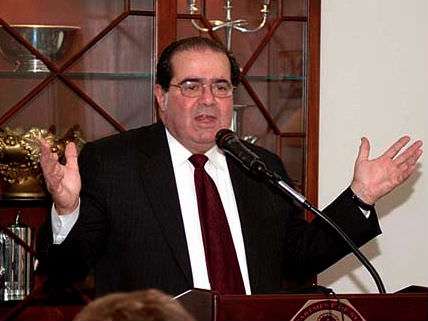Supreme Court Weighs Review of San Francisco Gun Control Scheme
Trigger lock requirement runs counter to District of Columbia v. Heller.

In its 2008 decision in District of Columbia v. Heller, the U.S. Supreme Court not only struck down Washington, D.C.'s handgun ban, it also struck down D.C.'s requirement that all firearms kept at home be "unloaded and dissembled or bound by a trigger lock or similar device." According to the majority opinion of Justice Antonin Scalia, the individual right secured by the Second Amendment voids such requirements because it protects the right of the people to keep a "lawful firearm in the home operable for the purpose of immediate self-defense."
Yet despite the Supreme Court's unequivocal judgment invalidating trigger lock-type regulations for guns lawfully kept at home, the U.S. Court of Appeals for the 9th Circuit voted last year to uphold a San Francisco gun control law which requires that any handgun kept at home be "stored in a locked container or disabled with a trigger lock." The existence of such requirements, the 9th Circuit asserted in Jackson v. San Francisco, "does not substantially burden the right or ability to use firearms for self-defense in the home."
To put it mildly, that judgment is wholly inconsistent with what the Supreme Court said in Heller.
Will the Supreme Court allow the 9th Circuit to openly flout one of its precedents? We may soon find out. Today the justices are meeting in private conference. Among the items scheduled for consideration is a petition filed by conservative lawyer Paul Clement seeking review of the 9th Circuit's Jackson opinion. "The decision below is impossible to reconcile with this Court's decision in Heller," that petition observes. "The Court of Appeals' conclusion that San Francisco may venture where this Court forbade the District of Columbia to go is so patently wrong that summary reversal would be appropriate."
Summary reversal means the Supreme Court would immediately overturn the 9th Circuit without bothering to consider any additional briefing or hear any oral arguments in the case.
It's a drastic step, but it's hardly unprecedented. In June 2012, for example, the Supreme Court summarily reversed a decision of the Montana Supreme Court which had upheld that state's ban on corporate political spending in open defiance of the 2010 Citizens United decision. "The question presented in this case is whether the holding of Citizens United applies to the Montana state law. There can be no serious doubt that it does," the Court observed.
The same thing is true here. There is simply no serious doubt that the holding of Heller applies to San Francisco's gun control scheme.


Show Comments (37)